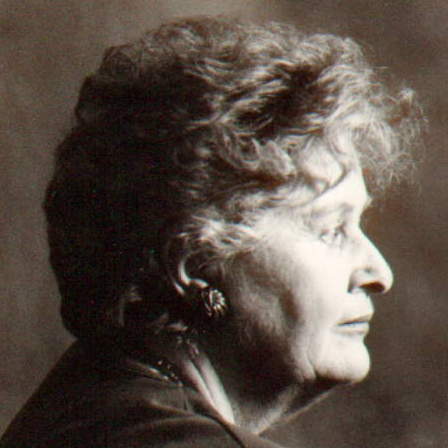 SPONSORED: An Integral Part - Lindsey Wallis looks forward to the Canadian Music Centre's tribute concert to composer Roberta Stephen.
SPONSORED: An Integral Part - Lindsey Wallis looks forward to the Canadian Music Centre's tribute concert to composer Roberta Stephen.
All sponsored features >>
Respecting the Spirit of The Merry Widow
GIUSEPPE PENNISI relates how 'Die lustige Witwe' is enthralling Rome
Franz Lehár's operetta Die lustige Witwe (The Merry Widow) had its debut in a Vienna theatre dedicated to 'light' performances on 30 December 1905. A few weeks earlier, there had been the world debut of Strauss's Salome in Dresden and just over a year earlier there had been the thud of the first edition of Puccini's Madama Butterfly at La Scala. Die lustige Witwe, of its kind, is a revolutionary work as those by Richard Strauss and Giacomo Puccini are 'in the golden thread' of musical theatre. All three are eminently feminist and, female heroism, in various ways, is the driving force. In fact, at the beginning of the twentieth century, the operetta seemed a form of performing art now at the sunset. In Austria, with the death of Johann Strauss, the golden age of the genre was over, reflecting a rich and very little 'imperial' bourgeoisie. In France, there were no longer Jacques Offenbach nor the world (mainly that of the Second Empire) in which his transgressive operettas cast a scratchy irony. Operettas lived in the subtly perverse satires that in Britain the 'award-winning firm' Gilbert & Sullivan launched towards Victorian and post-Victorian society, in works dense with 'idioms' and, therefore, difficult to translate and appreciate south of the Channel.
As with Salome and Madama Butterfly, Die lustige Witwe brought to the European scene a true revolutionary charge for three reasons. Firstly, it was not a more or less ironic representation of the society and politics of the time; instead, it was a visionary reading of how the Mitteleurope imagined Paris to be - metropolis of the future. It made fun too of the Balkan States that wanted to consider themselves on the way to modernization. Lehár came from a small Hungarian village and for decades had earned bread and butter in the army or, when he could, conducting country bands. Secondly, it uses a rich melodic line and inserts songs from 'golden thread' - the 'Song of Vilja' in the second act - along with loans from the melologue style - spoken accompanied by orchestra. Thirdly, the dramatic action leads to musical numbers, with dance in which, in addition to waltzes, polkas, mazurkas and traditional marches, ethnic music is included; it is Slavic music with lutes of Arab ancestry in the orchestra. Finally, the comedy in music is shrouded in a veil of melancholy, forerunner of a way of living about to end, almost as much as Der Rosenkavalier by Richard Strauss and Hugo von Hofmannsthal would have been six years later. The orchestration and the vocal lines of Die lustige Witwe make it a musical masterpiece, adored by conductors of the level of Kleiber, Rudel, von Karajan and von Matačić.
This premise is essential to understand the thesis that in whatever adaptation, the spirit of Die lustige Witwe must be respected. I would not be scandalized in the face of a 'visionary' setting perhaps in today's New York (as imagined by a small European bourgeoisie) with the Pontevedro as a banana Republic of the Caribbean or Central America. As long as the 'visionary' character is respected, and the balance between words and music and the magnificent score is maintained. In 1990, Teatro dell'Opera di Roma presented a production by Mauro Bolognini in which the plot was set in the 1930s, before the Second World War. It was set around Raina Kabaivanska and Mikael Melba, it worked perfectly and was seen both in the Italian capital and in other cities. In 2008, however, Teatro dell'Opera patched up the staging of an expensive production, partly in dialect, in Naples during 'the thrash emergency'. About a year ago, the Rome and Venice Opera Houses showed a staging by Damiano Michieletto and friends. It set the story in the banking world of the 1950s; the dialogue was in Italian and the singing in German. I was perplexed. (Read A Not So Merry Widow, 20 April 2019). However, the audience liked it so much that replicas were scheduled in Teatro dell'Opera's summer season at the Baths of Caracalla.
For the reasons discussed here on 26 June 2020, the season was transferred to the Circus Maximus: Die lustige Witwe was announced in concert form and in the original language (with surtitles in Italian and English). I attended the opening night on 31 July 2020. It is not in the strict sense a concert form, but what the French call a mise en espace. In the upfront stage, the main characters sing and act (the protagonist also dances and changes four elegant evening gowns), the orchestra is on stage, the overtitles to the right and left of the stage, and silent film tracks related to the text and music are projected are projected on a big screen. The dialogue is slightly cut and, therefore, the part of Njegus disappears.
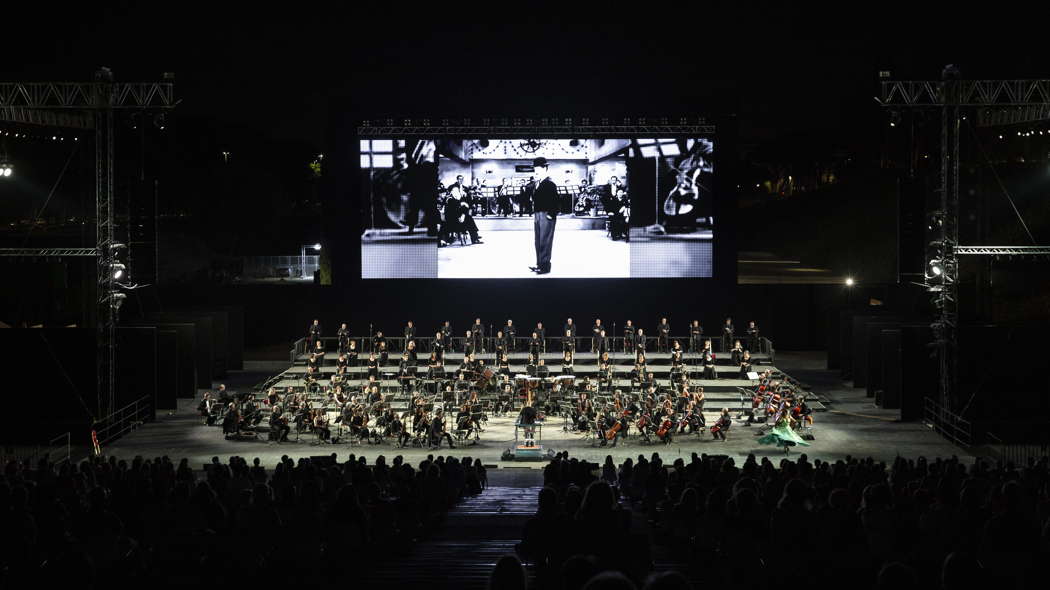
A scene from The Merry Widow at the Circus Maximus in Rome. Photo © 2020 Yasuko Kageyama
I need to congratulate the stage director Giulia Randazzo and set designer Giulia Bellè. They are two young participants in Teatro dell'Opera di Roma's Fabbrica project (for training and entry into the profession). They found in silent cinema the key to reread with irony and humour, under the melancholic veil of the past, the shortcomings of the present, especially the impossibility of close interaction between the performers due to the corona virus social distancing. They did an accurate archive search and created a real show within the show with their videos (as described in the 'further information' section of this review).
Without being Karajan or Matačić, and despite the difficult conditions of conducting outdoors on a very hot night, Stefano Montanari conducted quite well the excellent orchestra of the Teatro dell'Opera, in the hard balance between irony and melancholy, between joy and languor. The choir directed by Roberto Gabbiani was good.
The high level cast included Nadja Mchantaf (Hanna Glawari), Markus Werba (Danilo Danilowitsch), Andrea Concetti (Mirko Zeta), Hasmik Torosyan (Valencienne), Juan Francisco Gatell (Camille de Rossillon), Marcello Nardis (Raoul De St Brioche), Simon Schnorr (Vicomte Cascada), Roberto Accurso (Bogdanowitsch), Roberto Maietta (Kromow) and Alessio Verna (Pritschitsch).
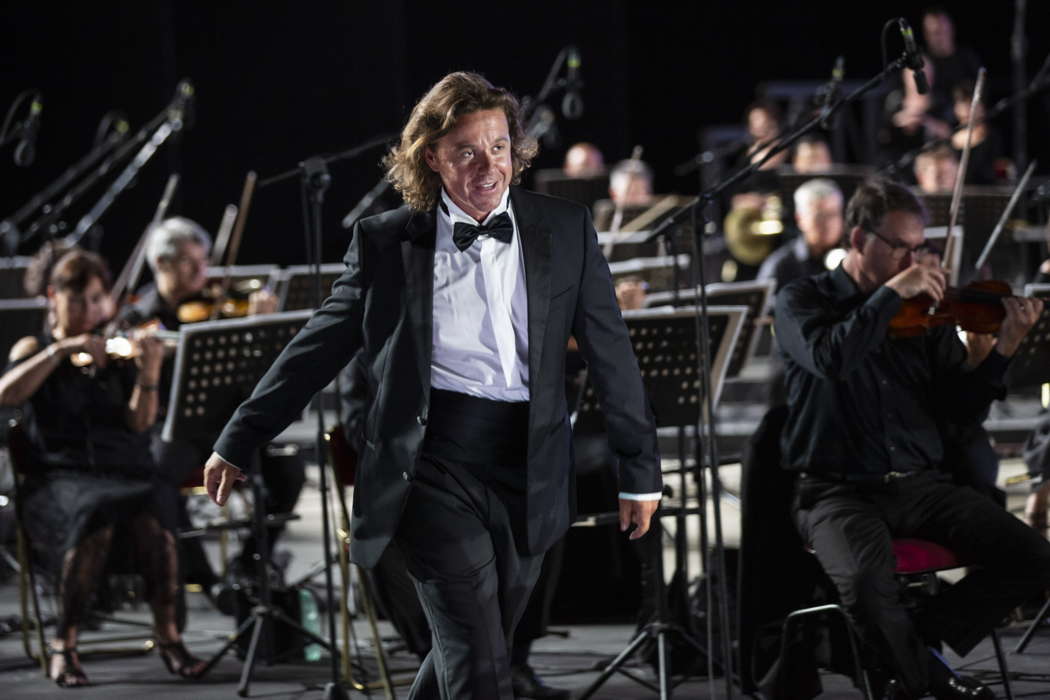
Markus Werba as Danilo in The Merry Widow at the Circus Maximus in Rome. Photo © 2020 Yasuko Kageyama
Alongside them are the young talents of Fabbrica: Sara Rocchi (Praskowia), Marianna Mappa (Sylviane) and Angela Schisano (Olga). Finally, the artists of the Rome Opera Choir who give voice to the Grisettes: AgnieszkaJadwiga, Emanuela Luchetti, Claudia Farneti, Stefania Rosai, Silvia Pasini and Marzia Zanonzini.
It is worth dwelling on the two leading couples. It is difficult to find an 'absolute' soprano (able to switch easily from lyrical to dramatic tone) and a baritone of agility who can sing, act and dance like Nadja Mchantaf and Markus Werba. Nadja Mchantaf was in the cast of the 2019 production too.
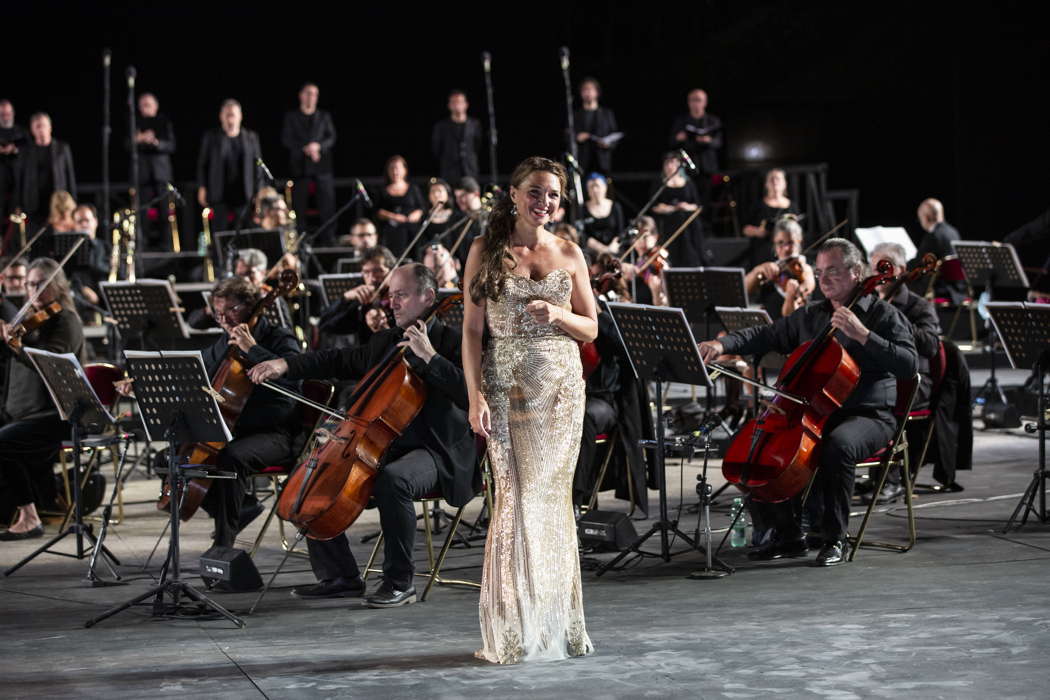
Nadja Mchantaf as Hanna Glawari in The Merry Widow at the Circus Maximus in Rome. Photo © 2020 Yasuko Kageyama
It is also difficult to find a lyrical soprano and a tenor of agility that can also sing, act and dance as Hasmik Torosyan and Juan Francisco Gatell. There was perfect musical and stage action.
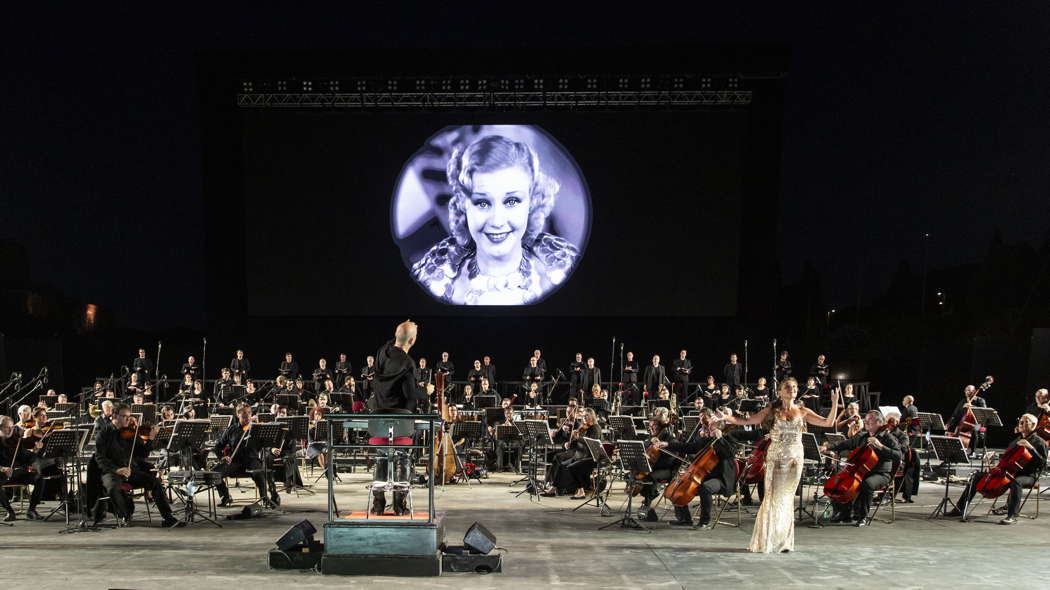
Nadja Mchantaf as Hanna Glawari in The Merry Widow at the Circus Maximus in Rome. Photo © 2020 Yasuko Kageyama
At the 31 July 2020 premiere, the 1,400 seat theatre was not full: probably some potential audience members were turned away by the original language and the 'concert version'. The ten minutes of sincere applause can be an invitation for other scheduled performances by word of mouth.
Copyright © 5 August 2020
Giuseppe Pennisi,
Rome, Italy

FURTHER INFORMATION ABOUT FRANZ LEHÁR
FURTHER LIVE CONCERT AND OPERA REVIEWS



